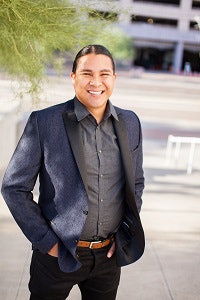We are compelled to write this open letter to our fellow faculty of color colleagues who are navigating tenure-track while raising little humans. As graduate students, we were warned that pursuing a tenure-track position would be both challenging and draining. The mental exhaustion and physiological impact of being on the tenure-track for people of color has been largely researched; much of it centers around social identities and how we navigate systems of privilege and oppression as minoritized individuals.
Yet, we do not need research to demonstrate how being racialized and labeled as (insert label) could derail our professional success. As minoritized and racialized beings, we confront the constant pressures to not only prove naysayers wrong but to also make it seem easy – a walk in the park – always high energy and smiling. This alone is enough to stall our desire to effect positive lasting change in our respective fields and communities. It is exhausting. We engage in a perpetual cost-benefit analysis that doesn’t always allow us to disengage from the grind of academia.
As parents we are bombarded with research that demonstrates what may happen to our children if we do not foster their curiosity and intellect. So, after countless hours of fighting to prove our legitimacy in academic spaces, navigating our own insecurities and working past countless researcher/writer blocks, we arrive home deplete of energy. Our ideal situation would be to just sit there and hold our little humans while reciprocal love fills our souls. However, those of us who have children know they are masterful at storing energy and using it up until their eyes are heavy with sleep. We plan to put them to bed and stay up to write a little more but that energy quickly dissipates into the air. We get into bed and cannot bring ourselves to sleep because the countless list of to-do’s keeps piling up, research ideas become a revolving door, and the emails never stop.
The struggle is real. Yet it seems more bearable when we embark on this journey together, as parents, colleagues and academic family. We understand institutions of higher education were not created for us nor were they meant for us to work within them as intellectuals. However, we are here resisting historical systems of privilege and oppression with love and empathy. We find it difficult to maintain our own identity while tenaciously working towards creating welcoming and validating spaces for all our students. Even on the most difficult days when we are running on no sleep, we are called to be there for our students. Time and time again, we step up to the challenge because our students are in some way apart of our extended family. We provide the care, love, and support we hope our children are receiving from their teachers. We understand the overwhelming feeling of delight when a student leaves our office affirmed. After all, this is why we pursued this career.
Then, we are sucked back into the grind.
The increased pressures come in the form of unspoken rules. Needing to conform to academic writing, speaking, professional interactions, and honoring established hierarchies of power; it takes away from our ability to serve the most marginalized and vulnerable communities. Our experiences in navigating a multitude of barriers demonstrate our desire to maintain our cultural identities intact, as faculty of color producing meaningful research that positively influences the futures of our people and our children. It is this ethic of care, compassion, and tenacity that allows us to be masterful multitaskers. Many of us decided to become faculty members because we didn’t see ourselves, our culture, or our histories reflected in what we were taught.
Dr. Jameson Lopez reflects on what it has been like for him:
 Dr. Jameson David Lopez
Dr. Jameson David Lopez“I learned quickly that academia encourages faculty to write about communities, not necessarily help change them. I have read articles that faculty have spent years on, only to see it cited or read by a select few other faculty. Why would faculty spend so much time on something that is meaningless or doesn’t contribute to the social good of our own communities? Because the institution doesn’t emphasize service to our communities. My service to my tribal community is a constant internal struggle. I wonder when I should head back to the homelands for ceremonies, gatherings and to simply teach my kids to follow our traditions. The need to conform to academia leaks into other aspects of my life, where I struggle to decide whether to put my kids in schools with higher performance scores on standardized testing, or to put them in schools with more students that look like them. Most importantly, I wonder how often I should let me kids miss school in order to attend ceremonies back in our tribal homelands. I have the same struggle in my academic career. For example, deciding how often I can skip university events to attend community events that are central to my own identity as an academic and Quechan person.”
The constant tuck and pull between honoring and centering out spiritual cultural being with the need to fulfill our professional duties is complicated at best. Passing on our traditions and culture to our children is a matter of survival. We know that if they know who they are and where they come from, they will stand firm and tall, not easily trampled.
Being a parent while on the tenure-track is filled with feelings of guilt, self-doubt, complicated decision making and mixed emotions. We are challenged to make critical decisions about our children’s educational pathways and how much to intervene – or not. Research tells us that minoritized students are more likely to be racialized, have their culture invalidated and more likely to face disciplinary actions. This alone is enough to paralyze any parent. We live at the margins and within them. We read and study the impact of negative schooling practices but we also have the ability to impact practice through our research. There is a silver lining. Just like you, we desperately reach into our deepest most internal being to keep ourselves from falling, to keep it together for the children. We want to tell you that you are not alone. There are many of us out here cheering you on. We understand the late nights, the guilt that arises from allowing our children to watch a few hours of consecutive television in order to finish an article, the difficulties that come with having to fly family in to help so we can attend conferences and/or even teach. We know you are on an ever-ending roller coaster replete with fears, insecurities, pride, helplessness, joy, excitement and obscurity. We know the sentiments of guilt and pressure that arise when we are forced to direct our energies to work while attempting to build fond memories with our children.
Stop. Take a deep breath. Remind yourself, you are doing the best you can even if it doesn’t feel like you are doing enough. The resiliency of our ancestors, our community and our children will overcome barriers placed in our pathway. Be kind to yourself. We validate your experience. We are in it together.
Dr. Claudia García-Louis is an assistant professor of educational leadership & policy studies at the University of Texas at San Antonio. Dr. Jameson David Lopez is an assistant professor in the Center for the Study of Higher Education at the University of Arizona.















